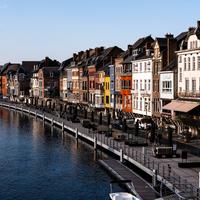8. Nederlandse Tijd
8. Holländische Zeit
Ολλανδική ώρα
8. Dutch Time
L'heure néerlandaise
Hora holandesa
8. Hollanda Saati
Willem I slaagt er niet in het Nederlands in ere te herstellen.
||fails|||||Dutch||honor||restore
Wilhelm I. scheitert bei der Wiedereinführung des Niederländischen.
Willem I does not succeed in restoring Dutch.
Willem Hollandalıyı restore etmeyi başaramıyorum.
Vlak na de oprichting van de nieuwe staat werd, op verzoek van de Brusselse ambachten, het Nederlands weer als officiële taal van Brussel erkend.
Immediately|||establishment|||new||||request||||crafts|||||||||recognized
Shortly after the founding of the new state, at the request of the Brussels crafts, Dutch was again recognized as the official language of Brussels.
Yeni devletin kurulmasından kısa bir süre sonra, Brüksel el sanatlarının talebi üzerine, Hollanda tekrar Brüksel'in resmi dili olarak kabul edildi.
De korte eenheid tussen Nederland en België van 1815 tot 1830 deed in Vlaanderen geen afbreuk aan het prestige en de economische macht van het Frans, dat de taal van de aristocratie bleef.
||unit|||||||did||||detriment|||prestige||||||||||||||remained
The short unity between the Netherlands and Belgium from 1815 to 1830 did not detract in Flanders from the prestige and economic power of French, which remained the language of the aristocracy.
Brussel en Den Haag waren elk om beurt een jaar zetel van de Groot-Nederlandse regering.
|||||||||||||||chính phủ
||||||each in turn|turn|||seat|||||government
Brussels and The Hague were each in turn one year seat of the Dutch government.
In de Tweede Kamer spraken alle Belgische afgevaardigden Frans.Koning Willem I wilde de Zuidelijke Nederlanden op een even ontwikkeld peil brengen als de Noordelijke, en stichtte daartoe een uitgebreid netwerk van scholen die onderwezen in de taal van het volk.
|||||||delegates|||||||Southern|||||developed|level||||||founded|for that||extensive|||||taught||||||
In the House of Representatives, all Belgian delegates spoke French. King Willem I wanted to bring the Southern Netherlands to an as developed level as the Northern one, and founded an extensive network of schools that taught in the language of the people.
Hij verhief het Nederlands tot enige officiële taal van de Vlaamse provincies, en kondigde dit in 1823 ook aan voor het tweetalige Brabant (en dus ook Brussel).
|elevated||||only||||||||announced|||||||bilingual|||||
He raised Dutch as the only official language of the Flemish provinces, and announced this in 1823 for the bilingual Brabant (and therefore also Brussels).
De Waalse provincies bleven eentalig Frans.
The Walloon provinces remained monolingual French.
De Koning wilde van het Nederlands de landstaal maken, maar de verfranste burgerij, de katholieke kerk en ook de Walen verzetten zich hiertegen.
|||||||national language||||Frenchified|||||||||oppose||against this
The King wanted to make Dutch the national language, but the French citizens, the Catholic Church and also the Walloons resisted.
De Franstalige burgerij zag haar plaats in openbare ambten, die onder Franse overheersing enkel de kennis van het Frans vereisten, bedreigd en de Walen vreesden in een overwegend Nederlandstalige staat steeds het vijfde wiel aan de wagen te zijn.
||||||||offices||||rule|||||||requirements|threatened|||Walloons|feared|||||||||wheel|||wagon||
The French-speaking bourgeoisie saw its place in public offices, which under French rule demanded only the knowledge of French, and threatened the Walloons in a predominantly Dutch-speaking state to always be the fifth wheel on the car.
Onder die druk voerde Willem I op 4 juni 1830 in heel hedendaags België de taalvrijheid weer in, waarmee de eentaligheid van Vlaanderen, waaronder ook Brussel, dus werd opgeheven.
||pressure|introduced|||||||contemporary|||language freedom|||||monolingualism|||including Brussels|||||was lifted
Under this pressure Willem I reintroduced language freedom in contemporary Belgium on 4 June 1830, thus eliminating the monolingualism of Flanders, including Brussels.
Belangrijk voor de latere ontwikkeling van het Nederlands in België was dat de Vlaamse bevolking voor het eerst op grote schaal in aanraking kwam met het Standaard Nederlands.
|||later development|||||||||||||||||scale||contact||||Standard Dutch|
Important for the later development of Dutch in Belgium was that the Flemish population came into contact with Standard Dutch on a large scale for the first time.
De katholieke kerk zag het "Hollandsch" enkel nog altijd als een Trojaans paard voor het protestantisme, terwijl de Franstalige aristocratie en burgerij het Nederlands nog steeds als ondergeschikt aan het Frans beschouwden.
|||||Dutch language||||||Trojan horse||||Protestantism||||||||||||secondary||||considered
The Catholic Church saw the "Hollandsch" only as a Trojan horse for Protestantism, while the French-speaking aristocracy and bourgeoisie still regarded Dutch as subordinate to French.
De gemeenschappelijke liberale en katholieke afkeer van het Nederlands was een van de aanleidingen voor de Belgische Revolutie en de latere eentaligheid van België.
|common|liberal|||aversion||||||||causes|||||||later|monolingualism||
The common liberal and Catholic aversion to Dutch was one of the reasons for the Belgian Revolution and the later monolingualism of Belgium.
Die uitgesproken voorkeur voor het Frans zou een grote invloed hebben op het taalgebruik in Brussel.
|pronounced|preference|||||||influence||||||
This strong preference for French would have a major influence on the language used in Brussels.

